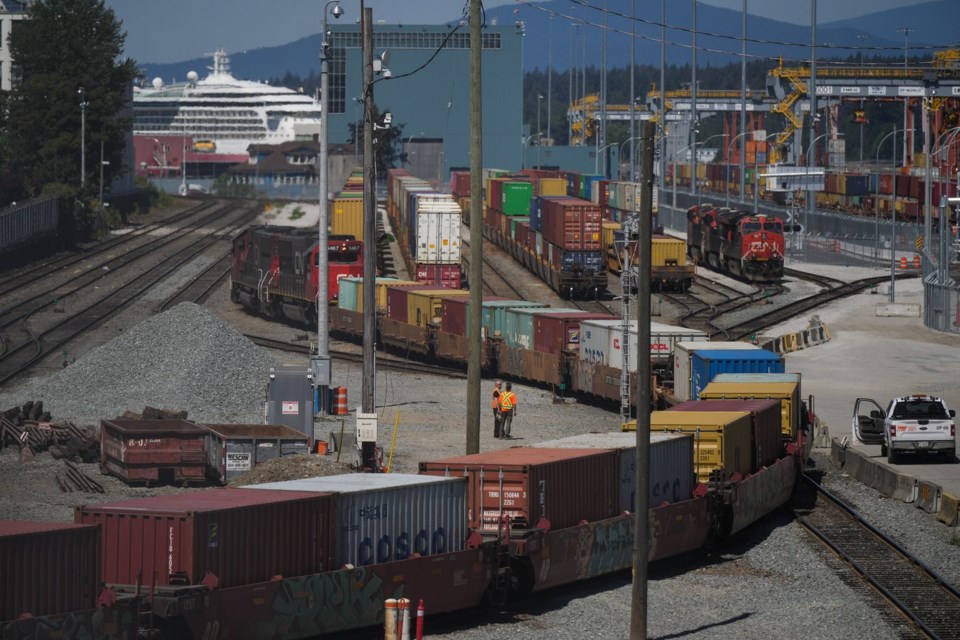MONTREAL — A potential work stoppage at Canada's two major railways this week would harm small companies — from mom-and-pop shops to outfits with scores of workers — the Canadian Federation of Independent Business says.
"Any disruptions to railway operations could be devastating for small businesses, their employees and communities," Jasmin Guenette, the group's head of national affairs, said in a release.
"Many small businesses rely on rail services to send and receive goods, products and essential materials. The longer the work stoppage goes on, the costlier it becomes for small firms who may lose sales and contracts if goods are not delivered or received on time."
A phased shutdown of the networks at Canadian National Railway Co. and Canadian Pacific Kansas City Railway Ltd. is already underway as the clock ticks down on negotiations with the union representing 9,300 engineers, conductors and yard workers. Both companies have issued lockout notices while the Teamsters Canada Rail Conference (TCRC) has also threatened to strike.
A full-fledged halt to rail traffic is set to begin one minute past midnight on Thursday morning unless the parties can agree to a deal on new contracts or to binding arbitration following months of near-deadlock around wages and scheduling.
The two companies move roughly $1 billion worth of goods per day, ranging from wheat to timber, oil and consumer products, according to the Railway Association of Canada.
On Monday, Labour Minister Steven MacKinnon stressed that the parties must hammer out a deal before deadline rather than relying on federal intervention, such as back-to-work legislation.
"These collective bargaining negotiations belong to CN Rail, CPKC and TCRC workers alone — but their effects will be borne by all Canadians," he said in a statement.
NDP Leader Jagmeet Singh told reporters he would not support a back-to-work bill.
Meanwhile, shipping giant Maersk has halted all Canada-bound shipments that involve rail transport and a cargo weight beyond what trucks can carry, the Danish company said in a customer notice Monday.
CN, after barring container imports from U.S. partner railroads on Friday, plans to stop loading any of the 40,000 containers it hauls each week — regardless of origin — starting Wednesday, according to company schedules.
A ban on all new cargo pickups at Canadian Pacific is coming Tuesday morning, it said last week.
The moves follow a halt on dangerous materials at both railways as well as shipments that need cooler temperatures, such as meat and medicine, to avoid seeing stranded loads go bad should a work stoppage occur.
For now, the 6,500 railcars that carry bulk grain across the country each week are still rolling.
"There is no plan B because there aren’t competitive alternatives, and people around the world would suffer," Wade Sobkowich, who heads the Western Grain Elevator Association, said in a release.
Bruce Burrows, CEO of the Chamber of Marine Commerce, said about 27 per cent of water-borne freight hauled through Quebec and Ontario relies on CN and CPKC.
"Some people are already starting to reroute, looking at the U.S. port-rail option as an alternative," he said in a phone interview.
"A work stoppage at Canada's Class 1 railways effectively breaks the supply chain for Canadians, and for many people around the world."
Ports are poised to see containers pile up on their docks if the impasse drags on, with ripple effects of the staged rail shutdown already being felt.
The Vancouver Fraser Port Authority said it has instructed ships en route to the country's largest port to "adjust their arrival times" by slowing down to prevent further congestion, said spokesman Alex Munro.
About two-thirds of all cargo into and out of the Port of Vancouver moves by rail, including 90 per cent of exports, he said. The port expects disruptions to shipments of containers, grain, potash coal and other key goods.
At the Port of Montreal, about 45 per cent of the freight passing through moves along CN or CPKC tracks.
"The Montreal Port Authority intends to redouble its efforts to allow more trucks to use its terminals, but it is certain that certain markets served from Montreal will face major challenges, notably Ontario and the Greater Toronto Area," said spokeswoman Mélanie Nadeau in an email.
Sixty per cent of container shipments through the Port of Halifax travel by rail, spokeswoman Lori MacLean said.
"Canadian gateways have already seen a reduction of volumes due to the uncertainty around rail operations," she said.
This report by The Canadian Press was first published Aug. 19, 2024.
Companies in this story: (TSX:CNR, TSX:CP)
Christopher Reynolds, The Canadian Press




